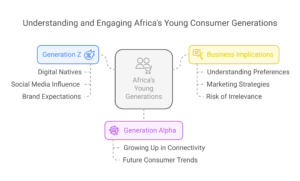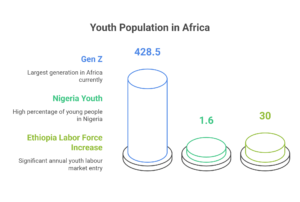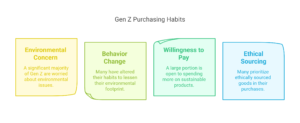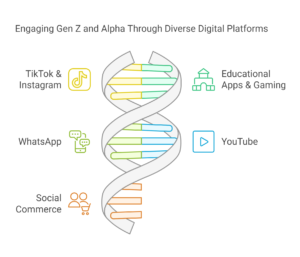Africa is at a demographic turning point, with Generation Z (born 1997–2012) and Generation Alpha (born 2013–2025) emerging as the continent’s most powerful consumer segments. With over 60% of Africa’s population under 25, these young generations are not just shaping the future—they are defining it right now.
Unlike previous generations, Gen Z and Alpha are digital natives, growing up in an era dominated by social media, mobile technology, and instant connectivity. Their expectations from brands go beyond products and services—they seek authenticity, inclusivity, and social responsibility. As a result, businesses that fail to understand and adapt to their evolving preferences risk losing relevance in Africa’s rapidly transforming market.
In this article, we’ll explore who Gen Z and Alpha are, their behaviours, and how businesses can effectively market to them using data-driven insights.

The Growing Influence of Gen Z and Alpha in Africa
1. The Numbers Behind Their Impact
- Africa’s population is expected to reach 2.5 billion by 2050, with a large portion belonging to these younger generations. By 2100, Africa’s youth will be equivalent to twice Europe’s entire population, and almost one-half of the world’s youth will be from Africa.
- According to AKI, Generation Z is currently the largest generation in Africa with 428,514,686 inhabitants making up 31.20% of the population, while Gen Alpha is on track to be the largest generation in history.
- Nigeria has one of the highest youth populations in the world, with 1.6 billion young people making up 70% of its population. At the same time, Ethiopia faces significant demographic pressure, with over 2 million youth entering the labor market annually, leading to a projected 30% increase in its labor force between 2019 and 2030.

2. Digital Natives in a Mobile-First World
Unlike previous generations, Gen Z and Alpha are mobile-first consumers.
- 80% of Africa’s internet users access the web through mobile devices.
- Social media penetration in Africa is growing rapidly, with platforms like TikTok, Instagram, and WhatsApp leading the way.
- Gen Z spends an average of 3–4 hours per day on social media, and Gen Alpha is exposed to digital content even earlier through tablets and smart devices.
3. Socially Conscious and Purpose-Driven
- Gen Z is deeply committed to sustainability and social responsibility, shaping their purchasing decisions and brand loyalty. 82% of Gen Z express concern about the state of the planet, and 72% have already changed their behaviour to reduce their environmental impact. This shift extends to their spending habits—66% are willing to pay more for sustainable or environmentally friendly products, while 73% are willing to pay more for ethically sourced goods.
For the African retail industry, this necessitates a shift towards more sustainable practices and greater transparency in business operations. Retailers who align with these values will find favor with Gen-Z consumers, influencing their spending behaviour.

Key Marketing Strategies to Win Over Gen Z and Alpha in Africa
1. Embrace Video-First Content and Storytelling
- Short-form video dominates. TikTok, YouTube Shorts, and Instagram Reels are their go-to platforms.
- Live streaming, behind-the-scenes content, and interactive challenges drive engagement.
- User-generated content (UGC) increases trust—brands should encourage customers to share their experiences.
2. Leverage Micro-Influencers and Community Engagement
- The global influencer market has seen significant growth, reaching $16.4 billion in 2022, with 1 in 4 marketers now leveraging influencer marketing as a key strategy. Among those already using it, 89% plan to either maintain or increase their investment in 2023, while 17% of marketers intend to invest in influencer marketing for the first time.
Kenyan fintech startup Chipper Cash partnered with local content creators on Instagram to explain financial literacy in a fun and relatable way.
3. Optimize for Mobile and Social Commerce
- Mobile and Social Commerce Dominance: Gen Z and Alpha in Africa prefer shopping through WhatsApp, Instagram, and TikTok, using mobile-friendly payment options like M-Pesa, Flutterwave, and Paystack for seamless transactions. Additionally, AI-powered chatbots and voice assistants enhance personalization and customer engagement.
4. Prioritize Authenticity and Brand Purpose
- Both generations prioritize authenticity and brands that demonstrate genuine values. To effectively reach these consumers, companies must not only articulate their brand stories but also embody the principles they promote, such as sustainability and social responsibility
- They expect brands to be transparent, inclusive and engaged in real conversations. Showing behind-the-scenes operations, company culture, and sustainability efforts builds trust.
5. Create Gamified and Interactive Experiences
- Augmented Reality (AR), gamification, and interactive quizzes enhance engagement.
- Loyalty programs that reward digital engagement (likes, shares, participation in challenges) work well.
6. Channel Strategy
Key platforms for reaching these demographics:
- TikTok and Instagram for Gen Z.
- Educational apps and gaming platforms for Gen Alpha.
- WhatsApp for community building.
- YouTube for long-form content.
- Interactive social commerce platforms.

Future Trends: What’s Next for Marketing to Gen Z and Alpha?
As Generation Z and Alpha continue to shape consumer behavior, businesses must adapt to emerging trends to stay relevant. AI-driven personalization will become more prominent, with chatbots, voice search, and predictive analytics helping brands tailor experiences in real time. Additionally, virtual and augmented reality (VR/AR) will revolutionize African retail, enabling consumers to explore virtual stores and try products digitally before purchasing.
The rise of digital-only brands will further transform the market, as more African businesses launch online-first, catering directly to mobile and social media users. With these shifts, brands that embrace innovation, personalization, and immersive experiences will have a competitive edge in capturing the loyalty of Africa’s young, tech-savvy consumers.
Why Businesses Must Adapt Now
Gen Z and Alpha are not the consumers of tomorrow—they are shaping markets today. Businesses that fail to adjust their marketing strategies risk being left behind.
To stay competitive, African brands must:
- Invest in digital-first marketing (short-form video, influencers, social commerce).
- Prioritize authenticity and social impact (sustainability, community engagement).
- Leverage data-driven marketing strategies to understand consumer behaviour.
At Marketing Analytics Africa (MAA), we help businesses navigate these shifts with data-backed insights and innovative marketing solutions.
Are you ready to future-proof your brand for Africa’s next-generation consumers? Contact MAA today to craft a winning marketing strategy.




